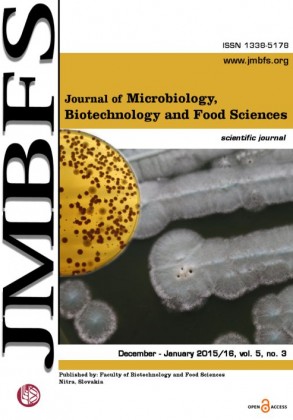COMPARISON OF COFFEE SPECIES BY SENSORY PANEL AND ELECTRONIC NOSE
DOI:
https://doi.org/10.15414/jmbfs.20115/16.5.3.234-237Keywords:
Sensory analysis, temporal dominance of sensations, volatile compounds, coffee originAbstract
The objective of a comparative study was to investigate the relationship between the sensory assessment of the varietal coffee samples and their aromatic profile measured using an electronic nose. Sensory analysis plays a very important role in the evaluation of food especially in the evaluation of plant products (coffee included). Sensory assessor's role is to assess the taste, smell, texture and visual attributes of the product. Equally useful in the objective evaluation of foods and their flavor profile appears to be an electronic nose. The study showed that there is a difference in a flavored coffee varietal profile. This study was performed using techniques TDS for 15 seconds by naïve panel. Most of the coffee samples appeared bitter with sour aftertaste. Flavors of coffee are also often linked with its taste. The aim of measuring the electronic nose was thus instrumental to detect similarities between the seventh varietal coffees. The results showed that the similarity between human measurement panel and substantiating the electronic nose. Data were reduced using PCA techniques and most of the samples correspond to the same position at both assays.Downloads
Download data is not yet available.
Downloads
Published
2015-12-01
How to Cite
Vietoris, V., Zajác, P., ÄŒapla, J., Mendelová, A., Križanová, K., & BeneÅ¡ová, L. (2015). COMPARISON OF COFFEE SPECIES BY SENSORY PANEL AND ELECTRONIC NOSE. Journal of Microbiology, Biotechnology and Food Sciences, 5(3), 234–237. https://doi.org/10.15414/jmbfs.20115/16.5.3.234-237
Issue
Section
Food Sciences
License
Copyright (c) 2015 Vladimir Vietoris, Peter Zajác, Jozef Čapla, Andrea Mendelová, Kamila Križanová, Lucia Benešová

This work is licensed under a Creative Commons Attribution 4.0 International License.
All papers published in the Journal of Microbiology, Biotechnology and Food Sciences are published under a CC-BY licence (CC-BY 4.0). Published materials can be shared (copy and redistribute the material in any medium or format) and adapted (remix, transform, and build upon the material for any purpose, even commercially) with specifying the author(s).





